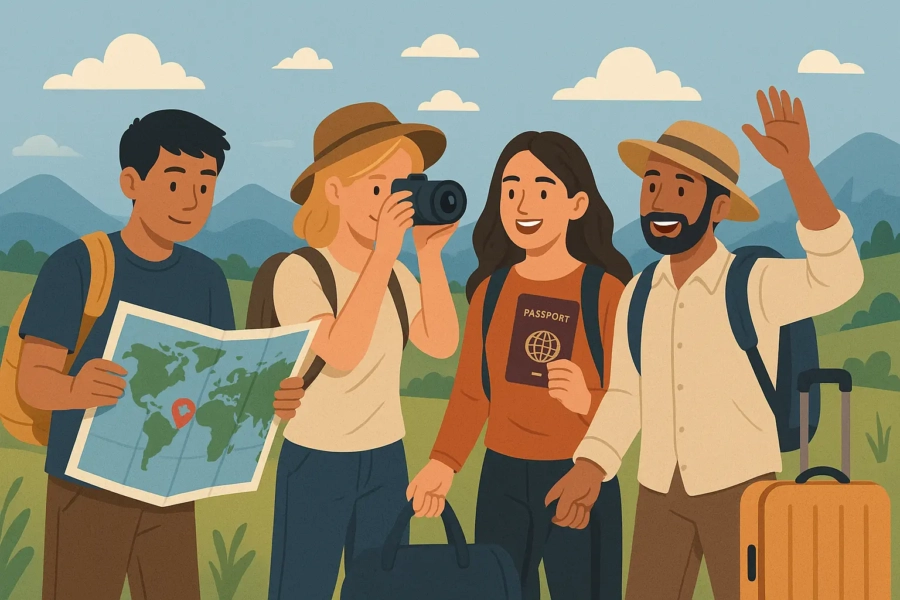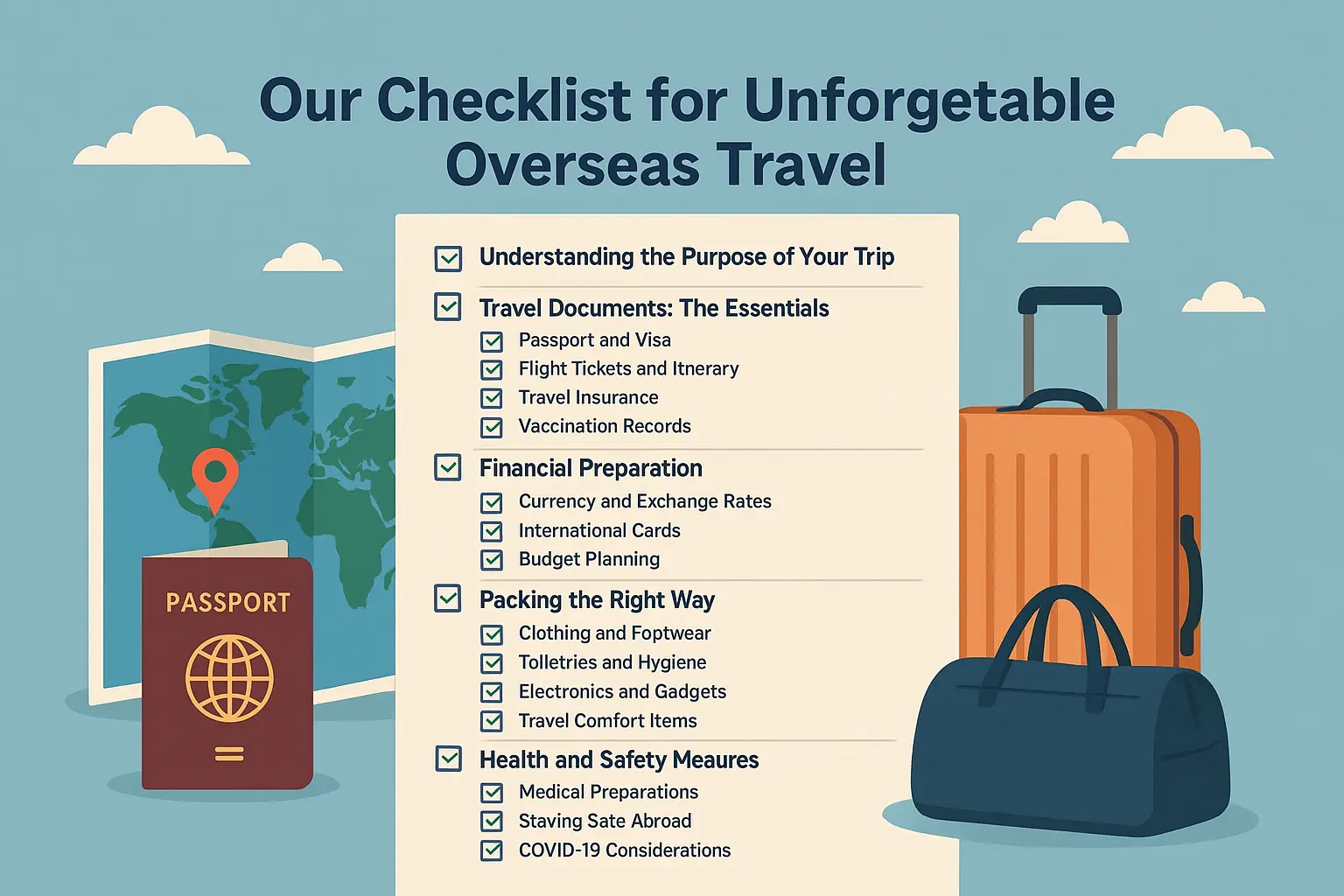Embarking on an overseas journey can be one of the most rewarding and life-changing experiences. Whether it’s your first trip or your tenth, there’s always something new to prepare for. Planning ahead helps ensure that your journey is memorable for all the right reasons. With this comprehensive checklist, you’ll feel confident, well-prepared, and ready to make the most of your overseas adventure.

Understanding the Purpose of Your Trip
Before anything else, clarify why you are traveling. Are you going for leisure, business, education, or perhaps a mix of reasons? This shapes everything—from your budget to what you pack.
Leisure Travel
If your trip is purely for relaxation or exploration, then your planning should focus on comfort, experiences, and spontaneity. You’ll want to include travel guides, comfortable clothing, and flexible bookings that allow detours or additional adventures.
Business Travel
For business-related trips, prioritize efficiency. Bring all necessary documentation, business attire, and tech gear. Your schedule will likely be tight, so focus on logistics and punctuality.
Study or Long-Term Travel
Those planning to stay longer for education or work must think about visas, local banking options, and housing. It’s important to integrate more deeply into the destination country, which means preparing beyond what a short-term traveler would.
Travel Documents: The Essentials
Nothing ruins a trip faster than missing or invalid documents. Start by creating a digital and physical folder of everything you need.
Passport and Visa
Ensure your passport is valid for at least six months beyond your travel date. Check the visa requirements for your destination well in advance—some countries require multiple steps or embassy visits.
Flight Tickets and Itinerary
Keep copies of your flight tickets and full itinerary. It’s helpful to store digital backups on your phone and cloud services like Google Drive or Dropbox.
Travel Insurance
This is non-negotiable. Travel insurance protects you from medical emergencies, trip cancellations, theft, and more. Choose a plan that suits your destination, activities, and length of stay.
Vaccination Records
Some countries require proof of vaccination. Visit a travel clinic a few weeks before departure to get any necessary shots or health advice.
Financial Preparation
Managing your money well while abroad helps avoid unwanted stress and allows for smoother transactions.
Currency and Exchange Rates
Research the local currency and current exchange rates. It’s smart to carry a small amount of local cash for immediate expenses upon arrival, such as transportation or snacks.
International Cards
Bring at least two credit or debit cards. Notify your bank of your travel dates to avoid getting your card blocked. Consider using travel-friendly cards with no foreign transaction fees.
Budget Planning
Estimate your daily expenses including food, transportation, accommodation, and activities. Always include an emergency fund to cover unexpected costs.
Packing the Right Way
Packing can either make or break your travel experience. Overpacking weighs you down, while underpacking leaves you scrambling to buy essentials.
Clothing and Footwear
Pack based on the weather and culture of your destination. Include versatile outfits you can mix and match. Comfortable walking shoes are a must, especially if you’re planning city tours or outdoor adventures.
Toiletries and Hygiene
Bring travel-sized toiletries to comply with airport security rules. Consider essentials like toothbrush, toothpaste, deodorant, sunscreen, and a small first-aid kit.
Electronics and Gadgets
Essential electronics include your smartphone, chargers, universal power adapter, and possibly a power bank. For work or content creation, add your laptop or camera to the list.
Travel Comfort Items
These include a neck pillow, eye mask, earplugs, and snacks. They make flights and long transfers more comfortable.
Health and Safety Measures
Nothing matters more than your well-being when you’re far from home. Taking preventive measures can make a big difference.
Medical Preparations
If you take prescription medication, bring enough for your entire trip, along with a doctor’s note. Know the local emergency number and nearby hospitals at your destination.
Staying Safe Abroad
Read up on common scams and safety concerns in the area. Keep your valuables secure in a money belt or hidden pouch, especially in crowded places.
COVID-19 Considerations
Although many places have relaxed rules, it’s good to carry masks, hand sanitizer, and check any entry requirements regarding testing or quarantine.
Tech and Connectivity
Staying connected while abroad keeps you informed and in touch with family or work.
International SIM Card or eSIM
Buy a prepaid SIM card or consider eSIM options available for global coverage. This allows you to use data and local calls at a much lower cost than roaming.
Offline Access
Download offline maps (Google Maps allows this) and translation apps to help you navigate areas without service. Keep digital copies of key documents accessible even without internet.
Useful Apps
Install travel apps like currency converters, local transport guides, language tools, and weather forecasts. Booking platforms such as Airbnb, Booking.com, and TripAdvisor also come in handy.
Planning Your Itinerary
You don’t need to plan every minute, but a flexible itinerary ensures you don’t miss out on top experiences.
Research and Inspiration
Start with destination guides, travel blogs, and YouTube videos. Make a list of must-see attractions, local foods, and hidden gems.
Booking in Advance
Some attractions, tours, or restaurants require advance reservations, especially in popular tourist destinations. Booking early saves time and money.
Leave Room for Spontaneity
Don’t overpack your days. Leave time for relaxation, unexpected discoveries, or even doing nothing. These often become the most memorable parts of a trip.
Accommodation and Transportation
Where you sleep and how you get around have a huge impact on your travel experience.
Choosing the Right Stay
Pick accommodations based on your priorities—price, location, amenities, and reviews. Don’t just rely on star ratings. Read guest reviews carefully.
Transportation Options
Understand the local transport system. Will you be using public transport, taxis, or renting a car? Apps like Rome2Rio or Citymapper can simplify planning.
Airport Transfers
Book your airport pickup ahead of time or know the safest, most affordable way to get to your accommodation upon arrival.
Cultural Sensitivity and Language
Being respectful and informed enhances your interaction with locals and enriches your experience.
Learning the Basics
Learn a few key phrases in the local language like “hello,” “thank you,” and “excuse me.” Locals appreciate the effort even if it’s not perfect.
Cultural Norms
Understand basic customs—how to greet people, tipping etiquette, dress codes, or eating manners. This helps you blend in and avoids accidental offenses.
Religious and Social Awareness
Respect religious practices, especially when visiting sacred sites. In some countries, certain behaviors or gestures that seem normal to you may be considered rude or even illegal.
Staying in Touch with Home
Keeping loved ones informed about your whereabouts and experiences adds an emotional layer to your trip and ensures peace of mind.
Regular Check-ins
Let someone know your itinerary and check in periodically, especially if traveling solo. A simple text or photo update can go a long way.
Sharing the Experience
Use social media, travel blogs, or journals to share highlights of your trip. This also creates a digital memory you can look back on.
Sustainable and Responsible Travel
Traveling responsibly ensures that future generations can enjoy the same experiences you’re having today.
Reduce Waste
Bring a reusable water bottle, bags, and utensils. Avoid single-use plastics as much as possible.
Support Local
Eat at local restaurants, buy handcrafted souvenirs, and stay in locally-owned lodgings to contribute to the community.
Respect the Environment
Stick to marked trails, don’t touch wildlife, and follow rules in protected areas. Be mindful of your impact, especially in natural destinations.
Handling Emergencies
Even with the best planning, things can go wrong. How you respond makes a big difference.
Lost Passport
Know the location of your country’s embassy or consulate. Keep a photocopy or scanned copy of your passport for easier replacement.
Theft or Loss
Report the incident to local authorities immediately. Travel insurance may cover your loss, so keep receipts and documentation.
Health Emergency
Go to the nearest hospital or clinic. If language is a barrier, use a translation app or call your travel insurance provider for assistance.
Final Check Before Departure
You’re packed, prepared, and excited. Here’s a quick pre-departure list to ensure you haven’t missed anything.
Home Preparations
Unplug electronics, arrange for pet or plant care, and set up mail redirection if needed. Let your neighbor or someone trustworthy know you’ll be away.
Travel Essentials
Double-check you have your passport, wallet, phone, keys, and essential documents in your carry-on. Keep chargers and one set of clothes in your hand luggage in case your checked bag gets delayed.
Arrive Early
Get to the airport early to avoid stress. Allow extra time for international flights and security checks. It’s better to relax at the gate than rush through the terminal.
Conclusion: Embrace the Journey
Traveling overseas is an adventure like no other. While it’s easy to get caught up in the excitement or worry about forgetting something, this checklist is your safeguard against most of the common travel mishaps. Remember, the most unforgettable moments often come from the unexpected. Be open, curious, and kind—and your journey will become one for the books.
Happy travels! ✈️🌍



